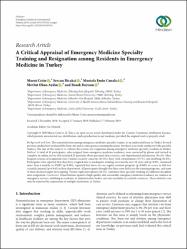| dc.contributor.author | Çetin, Murat | |
| dc.contributor.author | Bıçakçı, Sercan | |
| dc.contributor.author | Çanakçı, Mustafa Emin | |
| dc.contributor.author | Aydın, Mevlüt Okan | |
| dc.contributor.author | Bayram, Başak | |
| dc.date.accessioned | 2022-05-11T14:37:01Z | |
| dc.date.available | 2022-05-11T14:37:01Z | |
| dc.date.issued | 2019 | |
| dc.identifier.issn | 2090-2840 | |
| dc.identifier.issn | 2090-2859 | |
| dc.identifier.uri | https://doi.org/10.1155/2019/6197618 | |
| dc.identifier.uri | https://hdl.handle.net/20.500.11776/8535 | |
| dc.description.abstract | Background and Aim. The nonsatisfaction among emergency medicine specialty trainees is an underrated issue in Turkey. Several previous studies have evaluated the burn-out and its consequences among physicians, but there is no study conducted with specialty trainees. The aim of this study is to evaluate the reasons for resignation among emergency medicine specialty residents in Turkey. Method. A total of 41 participants, who resigned from emergency medicine residency, were contacted by phone and invited to complete an online survey that included 25 questions about personal characteristics and departmental information. Results. Most frequent reasons of resignation were violence/security concerns (63.4%), busy work environment (53.7%), and mobbing (26.8%). Participants who reported that they have resigned due to inadequate training were mostly over 30 years old (p=0.02), continued more than 6 months to EMST (p<0.001), reported that there was no regular rotation program (p=0.003) or access to full-text scientific journals (p=0.045) in their department. All participants thought that there were deficits in the training programs, and none of them declared regret for resigning. Twenty-eight participants (68.2%) continued their specialty training at a different discipline after resignation. Conclusion. Major barriers against a high-quality and sustainable emergency medicine residency are violence in emergency services, mobbing in academic or administrative bodies, and inaccessibility to scientific resources. These obstacles can only be removed by cooperation of multiple institutions in Turkey. | en_US |
| dc.language.iso | eng | en_US |
| dc.publisher | Hindawi Ltd | en_US |
| dc.identifier.doi | 10.1155/2019/6197618 | |
| dc.rights | info:eu-repo/semantics/openAccess | en_US |
| dc.subject | Attrition | en_US |
| dc.subject | Stress | en_US |
| dc.title | A Critical Appraisal of Emergency Medicine Specialty Training and Resignation among Residents in Emergency Medicine in Turkey | en_US |
| dc.type | article | en_US |
| dc.relation.ispartof | Emergency Medicine International | en_US |
| dc.department | Fakülteler, Tıp Fakültesi, Dahili Tıp Bilimleri Bölümü, Acil Tıp Ana Bilim Dalı | en_US |
| dc.authorid | 0000-0002-3268-0499 | |
| dc.authorid | 0000-0002-0667-7966 | |
| dc.authorid | 0000-0002-8060-8803 | |
| dc.authorid | 0000-0003-2084-2646 | |
| dc.authorid | 0000-0001-9015-1782 | |
| dc.identifier.volume | 2019 | en_US |
| dc.institutionauthor | Bıçakçı, Sercan | |
| dc.relation.publicationcategory | Makale - Uluslararası Hakemli Dergi - Kurum Öğretim Elemanı | en_US |
| dc.authorwosid | Bayram, Başak/L-6160-2019 | |
| dc.authorwosid | Bıçakçı, Sercan/C-9518-2019 | |
| dc.authorwosid | Çetin, Murat/AAS-6939-2021 | |
| dc.authorwosid | Aydin, Mevlut Okan/AAI-3331-2021 | |
| dc.identifier.wos | WOS:000460222400001 | en_US |
| dc.identifier.pmid | 30911419 | en_US |



















